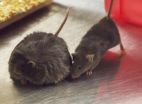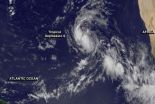(Press-News.org) A gambler's decision to stay or fold in a game of cards could be influenced by a chemical in the brain, suggests new research from the University of British Columbia.
The rise and fall of dopamine plays a key role in decisions involving risk and reward, from a baseball player trying to steal a base to an investor buying or selling a stock. Previous studies have shown that dopamine signals increase when risky choices pay off.
"Our brains are constantly updating how we calculate risk and reward based on previous experiences, keeping an internal score of wins and losses," says Stan Floresco, co-author and professor in UBC's Dept. of Psychology. "Dopamine appears to play an important role in these processes, influencing our everyday choices."
The study saw rats choose between safe and risky rewards - similar to what investors face on Wall Street. Pressing one lever gave the rodents a small, but guaranteed reward, not unlike a bond. The other lever yielded a large reward or nothing, similar to a high-risk stock.
Researchers altered the rats' decision-making process by shutting down or turning on the dopamine signals in their brains. When the rats played risky and lost, researchers turned on dopamine signals when normally they would have decreased. Subsequently, the rats made riskier decisions. Conversely, when the rats played risky and won, researchers turned dopamine signals off. Here, the rats began to play more conservatively.
"By temporarily knocking these chemical signals out, it demonstrates how significant they are in altering our decisions, even if it's against our better judgment," says Floresco.
Background
Abnormal dopamine levels are associated with several psychiatric disorders, including schizophrenia, depression and drug addiction.
Current treatments for these disorders involve drugs that heighten or lower dopamine levels, but not immediately following a risk and reward decision, like the rats experienced. Therefore, the potential clinical application of the approaches used in the study is unclear.
"The timing of the stimulation is important," explains Floresco. "By understanding how these signals work to influence our behaviour, these findings can provide insight into what happens when these signals go awry, as may occur in numerous psychiatric disorders."
INFORMATION:
The study, Overriding Phasic Dopamine Signals Redirects Action Selection during Risk/Reward Decision Making, is published in Neuron.
Floresco's co-authors are Colin Stopper, Maric Tse, David Montes and Candice Wiedman of UBC's Dept. of Psychology and the Brain Research Centre.
Chemical signals in the brain help guide risky decisions
2014-09-11
ELSE PRESS RELEASES FROM THIS DATE:
Mice and men share a diabetes gene
2014-09-11
A joint work by EPFL, ETH Zürich and the CHUV has identified a pathological process that takes place in both mice and humans towards one of the most common diseases that people face in the industrialized world: type 2 diabetes.
This work was conducted in Johan Auwerx's (EPFL) and Ruedi Aebersold's (ETH Zürich) laboratories, and succeeded thanks to the combination of each team's strengths. The relevance of their discovery, published today in Cell Metabolism, results from their joint effort.
In Lausanne, the researchers carried out a detailed study of the genome and ...
Compound protects brain cells after traumatic brain injury
2014-09-11
A new class of compounds has now been shown to protect brain cells from the type of damage caused by blast-mediated traumatic brain injury (TBI). Mice that were treated with these compounds 24-36 hours after experiencing TBI from a blast injury were protected from the harmful effects of TBI, including problems with learning, memory, and movement.
Traumatic brain injury caused by blast injury has emerged as a common health problem among U.S. servicemen and women, with an estimated 10 to 20 percent of the more than 2 million U.S. soldiers deployed in Iraq or Afghanistan ...
Proactive monitoring of inflammatory bowel disease therapy could prolong effectiveness
2014-09-11
BOSTON – Proactive monitoring and dose adjustment of infliximab, a medication commonly used to treat inflammatory bowel disease (IBD), could improve a patient's chances of having a long-term successful response to therapy, a pilot observational study at Beth Israel Deaconess Medical Center concludes.
The study, published in the Inflammatory Bowel Diseases, evaluated the levels of infliximab, an antibody designed to bind to and block the effects of TNF-alpha, an inflammatory protein found in high levels in patients with IBD, such as Crohn's disease and ulcerative colitis, ...
LSU scientists lead research on speciation in the tropics
2014-09-11
BATON ROUGE – In a study that sheds light on the origin of bird species in the biologically rich rainforests of South America, LSU Museum of Natural Science Director and Roy Paul Daniels Professor in the Department of Biological Sciences, Robb Brumfield, and an international team of researchers funded by the National Science Foundation, or NSF, published a paper this week challenging the view that speciation – the process by which new species are formed – is directly linked to geological and climatic changes to the landscape.
The researchers, whose findings were published ...
Microscopic diamonds suggest cosmic impact responsible for major period of climate change
2014-09-11
Around 12,800 years ago, a sudden, catastrophic event plunged much of the Earth into a period of cold climatic conditions and drought. This drastic climate change—the Younger Dryas—coincided with the extinction of Pleistocene megafauna, such as the saber-tooth cats and the mastodon, and resulted in major declines in prehistoric human populations, including the termination of the Clovis culture.
With limited evidence, several rival theories have been proposed about the event that sparked this period, such as a collapse of the North American ice sheets, a major volcanic ...
Facebook posts reveal personality traits, but recent changes could make it harder to do so
2014-09-11
LAWRENCE — A study from the University of Kansas finds that people can accurately detect the personality traits of strangers through Facebook activity; however, changes to the social media site in the past three years could be making it harder to do so.
Researchers sampled 100 Facebook users, paralleling the demographics of the social networking site, and asked them to fill out a personality survey. A group of coders looked at each person's Facebook activity, 53 cues in all, to see whether certain personality types were more likely to do specific activities. The researchers ...
Sometimes, adolescents just can't resist
2014-09-11
Don't get mad the next time you catch your teenager texting when he promised to be studying.
He simply may not be able to resist.
A University of Iowa study found teenagers are far more sensitive than adults to the immediate effect or reward of their behaviors. The findings may help explain, for example, why the initial rush of texting may be more enticing for adolescents than the long-term payoff of studying.
"The rewards have a strong, perceptional draw and are more enticing to the teenager," says Jatin Vaidya, a professor of psychiatry at the UI and corresponding ...
Satellite view of newborn Atlantic Tropical Depression 6
2014-09-11
The sixth tropical depression of the Atlantic Ocean Hurricane Season formed in the Eastern Atlantic Ocean and NOAA's GOES-East satellite captured it.
A visible image of Tropical Depression 6 was taken by NOAA's GOES-East satellite at 7:45 a.m. EDT on September 11 as it developed. The image was created by NASA/NOAA's GOES Project at the NASA Goddard Space Flight Center in Greenbelt, Maryland.
In addition to using GOES imagery and data from other NOAA and NASA satellites, The National Hurricane Center also uses measurements from the Advanced Scatterometer or ASCAT instrument ...
NJIT researchers working to safeguard the shoreline
2014-09-11
An NJIT research team has estimated the total mass of oil that reached the Gulf of Mexico shore in the wake of the BP Deepwater Horizon blowout. It's the first time such an estimate was reported, and the study is published in the August issue of Environmental Science and Technology.
The researchers found that 22,000 tons of oil reached the Gulf shoreline in 2010. This finding will help officials determine the persistence of oil on the shore and identify potential harm to the ecosystem.
The study was conducted by the Center for Natural Resources Development and Protection ...
Penn Medicine bioethicists call for greater first-world response to Ebola outbreak
2014-09-11
PHILADELPHIA – Amid recent discussion about the Ebola crisis in West Africa, Penn Medicine physicians say that high-income countries like the United States have an obligation to help those affected by the outbreak and to advance research to fight the deadly disease — including in the context of randomized clinical trials of new drugs to combat the virus. The two new editorials, which will appear "online first" in JAMA on September 11th, are written by faculty members in the Perelman School of Medicine at the University of Pennsylvania and the Department of Social Science, ...




